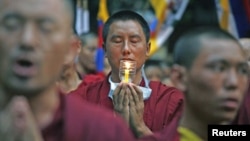According to the recently released U.S. State Department 2011 International Religious Freedom Report, a number of countries made significant progress to loosen or eliminate restrictions on their citizens’ right to practice their religion. In North Africa and the Middle East, for example, countries in political transition took the first steps toward democracy, and began to take steps toward greater inclusiveness; passing anti-discrimination law; and allowing many houses of worship to reopen.
Unfortunately, in many countries the ability to practice one’s religion is not supported and is even hindered by the government. Despite easing some restrictions on registered religious groups and on church construction, the government of Burma retained a number of harsh laws impinging on religious freedom.
Sectarian violence and an environment of impunity plague the Egyptian transition, continuing conditions experienced during the Mubarak regime. Globally, governments frequently failed to protect religious minorities, or used registration laws to restrict the rights of religious communities, including laws that make it impossible for groups to own property or to receive state financial support.
Elsewhere, authorities often failed to distinguish between peaceful religious practice and criminal or terrorist activities.
In the harshest places, certain religions are banned completely. Governments restricted religious freedom in a variety of ways, such as passing laws that favored state-sanctioned groups even as they restricted the rights of others to practice their religion. Some countries have laws against blasphemy, apostasy and defamation of religion laws which carry a death sentence.
Other governments may intimidate and control religious groups by treating them as security threats. They may utilize laws on combating extremist or terrorist activity to justify repression of religious organizations and to restrict the freedom to worship of minority religions.
And finally, 2011 saw a global increase in anti-Semitism, manifested in Holocaust denial or glorification, acts of desecration and assault, “blood libel,” and cartoons demonizing Jews.
As Secretary of State Hillary Clinton said, “The world should and must hold governments to a different standard than individuals. Whether they are secular or religious, Muslim or Christian or Hindu or officially atheistic or anything else, governments have solemn obligations to protect the human rights of all citizens, no matter what religions they believe or don’t believe.”













